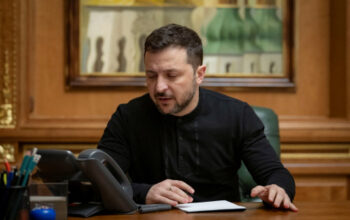By Sabine Siebold, Jan Lopatka and Jason Hovet
PRAGUE (Reuters) -NATO chief Jens Stoltenberg on Friday dismissed warnings by Russian President Vladimir Putin that allowing Ukraine to use Western weapons to strike inside Russian territory might lead to an escalation.
Speaking on the sidelines of a NATO foreign ministers’ meeting in Prague, Stoltenberg said the alliance had heard such warnings many times before and self-defence was not escalation.
“This is nothing new. It has … been the case for a long time that every time NATO allies are providing support to Ukraine, President Putin is trying to threaten us to not do that,” he told reporters.
“And an escalation – well, Russia has escalated by invading another country.”
Putin on Tuesday warned NATO members against allowing Ukraine to fire their weapons into Russia and raised once again the risk of nuclear war after several allies lifted restrictions imposed on the use of weapons donated to Kyiv.
In a marked policy shift, U.S. President Joe Biden approved Ukraine using U.S. weapons to strike targets inside Russia that were attacking the Ukrainian city of Kharkiv, U.S. Secretary of State Antony Blinken confirmed in Prague.
He said Washington’s move was a result of a U.S. strategy of adjusting and adapting to the battleground, indicating that Moscow’s attacks on Kharkiv have necessitated this.
Kharkiv, Ukraine’s second largest city, is 19 miles (30 km) from the border with Russia.
KHARKIV OFFENSIVE
Russian fighter jets flying inside Russia out of reach of Ukrainian air defences have been supporting the offensive by loosing high-precision glide bombs at Ukrainian defence lines and into Kharkiv, where they have caused numerous civilian casualties.
Stoltenberg said Ukraine had the right to strike legitimate military targets inside Russia, especially since the border and the front line near Kharkiv were more or less the same, and it was not reasonable to assume Kyiv should not hit back.
“Ukraine has the right for self-defence, we have the right to help Ukraine uphold the right for self-defence, and that does not make NATO allies a party to the conflict,” he added. “That was the case back in February 2022, that was the case last year, that remains the case.”
In Berlin on Friday, a German government spokesman said Ukraine could use weapons supplied by Berlin to defend itself against attacks launched from just inside Russia against the Kharkiv border region, in accordance with international law.
In Prague, Dutch Foreign Minister Hanke Bruins Slot stressed Ukraine’s right to self-defence without imposing geographical limits on the use of weapons.
But other allies such as Italy refuse to go this far, with its foreign minister arguing that his country was banned by the constitution from allowing Kyiv to use donated weapons outside Ukraine.
Lithuania’s Foreign Minister Gabrielius Landsbergis called on these allies to change their stance since “the time is coming when it will be determined whether we as an alliance are serious … about assisting Ukraine to win this war”.
“I have always been of an opinion that Ukrainians are absolutely capable of defining the targets. I have full confidence that they know and understand what is needed, where the threat comes from,” Landsbergis told reporters.
His comments were echoed by his Polish counterpart Radoslaw Sikorski, who stressed that Warsaw had never imposed such restrictions.
“We wish Ukraine victory, we wish them the recovery of all the occupied territories … Ukraine has the right to defend itself according to the rules of humanitarian law.”
(Reporting by Sabine Siebold, Humeyra Pamuk, Jan Lopatka and Jason Hovet in Prague, Alan Charlish in Warsaw and Enrico Sciacovelli in GdanskEditing by Benoit Van Overstraeten, Gareth Jones, Alison Williams and Giles Elgood)



